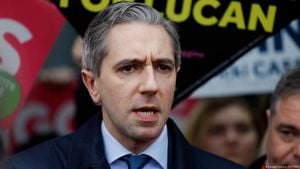The Irish political scene has witnessed significant changes following the general election on November 29, 2024. With the air thick with anticipation and intrigue, results began to flood in, presenting a varied tableau of party performances. At the forefront, Fianna Fail (FF), spearheaded by Micheal Martin, garnered 21.9% of the first preference votes, securing its position as the leading party. Close behind, Fine Gael (FG), led by the TikTok-savvy Taoiseach Simon Harris, received 20.8%. The radical left-wing party, Sinn Féin (SF), brought up the rear with 19% of the vote, demonstrating the shifting allegiances and discontent among the electorate.
While the results painted one picture, they also brought to light fractured alliances and voter sentiments across Ireland. Observers noted this election’s unpredictable nature, with Theresa Reidy, Senior Lecturer at University College Cork, remarking, "People often change their minds during election campaigns across Europe. The old links between voters and political parties simply don't exist anymore, and the election campaign matters a lot." The narrative has evolved; parties are no longer bound by their historical foundations but are encouraged to adapt, portraying themselves as the ultimate solution makers.
A notable aspect of the election was the increase of independent candidates, which collectively obtained 13.2% of the vote. This rise reflects growing disillusionment with traditional parties and indicates the electorate's desire for alternatives beyond the longstanding dominance of Fianna Fail and Fine Gael. Gary Murphy, Professor of Political Science at Dublin City University, explained, "Independents have become the fourth largest force in the country. The existence of these candidates, unaffiliated with any party, is typically Irish and tied to the weaknesses of our local institutions and the super-proportional electoral system."
Meanwhile, the Green Party (GP), once touted as the voice of climate action under the stewardship of Eamon Ryan, suffered devastating losses, dropping 3% of its prior support. Ryan himself expressed disappointment, stating, "It's difficult for a small party to getinto government... We weren't able to break away from our historical limitations. People voting to maintain the current government went for Fianna Fail or Fine Gael, but not us."
The election results brought forth discussions on potential government formations. With the prospect of coalition-building looming, the two traditional parties are likely to seek alliances to secure the majority necessary to govern. Indeed, strategists are considering partnerships with either Labour, which captured 4.7% of the vote, or the Independents, acknowledging the importance of stability and broad support. Yet, Labour’s leader, Ivana Bacik, has made it clear her priority lies with crafting leftist coalitions.
Economically, the outgoing coalition’s reign can point to substantial growth, with projections estimating 4% growth for 2025 and a public surplus of €25 billion. Such economic stability is often credited to the influx of American multinationals attracted to Ireland’s favorable corporate tax regime. Tom McDonnell, Director of the Nevin Economic Research Institute, remarked, “These benefits have softened the effects of the purchasing power crisis.” Still, threats loom on the horizon, particularly with shifts anticipated from U.S. policies under Donald Trump’s presidency.
Despite Sinn Féin’s substantial showing, it appears set to continue its tenure as the opposition. Once recognized as the leader following the 2020 general election, the party has crafted its identity around resolving the perceived housing crisis within the country. Sinn Féin leader Mary Lou McDonald maintains the vision of confronting the coalition parties, proclaiming, "The two-party system no longer exists... We want to change people's lives, and another five years under Fianna Fail and Fine Gael would be counterproductive." The party's framework proposes addressing the housing disconnect, where rental rates rose dramatically, burdening even the middle class.
Nonetheless, challenges persist for Sinn Féin as it navigates its past affiliations with the Irish Republican Army (IRA). Long touted for its radical leftist agenda, the party is slowly distancing itself from its contentious history, focusing on contemporary social issues like housing. Nonetheless, immigration issues have complicated its narrative, forcing the party to adjust its stance to contend with rising concerns among its traditionally working-class support base concerning immigration levels. Rory Costello, Professor of Political Science at the University of Limerick, pointedly noted, "Sinn Féin needs to adopt positions appealing to its diverse supporters, but that's nearly impossible as these stances can alienate certain factions."
Looking forward, the sequence of events post-election will dictate unique coalition dynamics. Micheal Martin’s leadership, having led the party since 2011, may place him back on the national stage as Taoiseach, continuing his legacy of governance. Within this new fabric of the Dáil Éireann (House of Representatives), the elected representatives will convene for the first time on December 18, potentially shaping the next chapter of Ireland's political narrative.
The formation of the new government promises to be less straightforward than years prior, with the reduced number of reliable partners complicate traditional alliances. Political experts will be closely watching coalition maneuvers, reiteratively emphasizing the importance of adaptability to political environments amid this transformative moment. The renewed intentions of all parties signal incremental shifts toward inclusivity and solutions-focused governance, drawing heightened interest from constituents weary of politics as usual.
Through the lens of this election, the Irish political environment stands at the turn of change, reflecting the often tumultuous yet dynamic nature of party politics. To achieve effective governance, overcoming traditional divides and forming new coalitions will be imperative for any governing body going forward. The stakes are high, and the political arena is set for captivating narratives yet to be told, making it more than just another political story but rather the dawn of new political figures and fresh perspectives shaping the fabric of Ireland's future.



